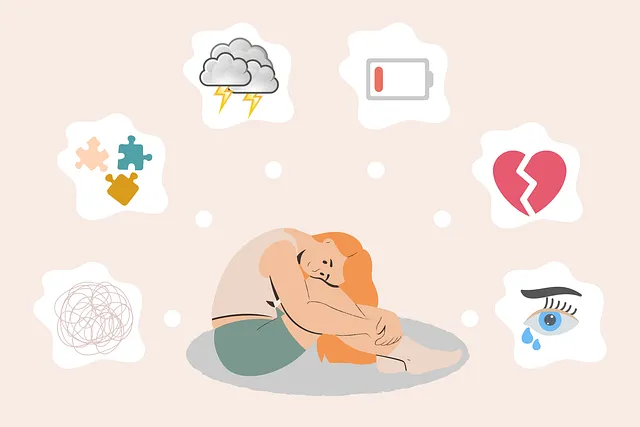Kaiser Permanente's Lakewood mental health center offers powerful group facilitation for mental wellness, creating safe, inclusive environments through active listening, empathy, and structured activities. The Community Outreach Program Implementation successfully prevents depression and cultivates compassion, fostering open dialogue, mindfulness, and resilience within supportive communities, as evidenced by satisfied reviews. Engaging activities like meditation, art therapy, and self-care practices facilitate healing, while risk assessments ensure an inclusive environment tailored to diverse needs, making it a notable destination for mental health support. The center measures success through structured assessments and participant feedback, ensuring effective programs that enhance mental wellness.
Mental wellness group facilitation plays a pivotal role in fostering community and healing. This article explores effective techniques for leading such groups, focusing on creating safe spaces at the Kaiser Permanente Mental Health Center in Lakewood. We delve into strategies that promote engagement, connection, and healing among participants, backed by insights from successful sessions at this renowned facility. Discover how these methods enhance mental wellness and read reviews highlighting their impact.
- Understanding Group Facilitation for Mental Wellness
- Techniques to Create a Safe and Supportive Environment
- Engaging Activities for Promoting Healing and Connection
- Measuring Success: Evaluating the Impact of Group Sessions at Kaiser Permanente Mental Health Center, Lakewood
Understanding Group Facilitation for Mental Wellness

Mental wellness group facilitation plays a pivotal role in creating supportive environments for individuals seeking healing and growth. At Kaiser Permanente mental health centers, like the one in Lakewood, facilitators employ various techniques to foster meaningful connections within the group dynamic. This approach is not just therapeutic but also empowers participants to navigate their mental health journeys with enhanced coping strategies.
Effective facilitation involves a blend of active listening, empathy, and structured activities tailored to address issues such as depression prevention and compassion cultivation practices. The Community Outreach Program Implementation at these centers emphasizes inclusive spaces where members can share experiences, gain insights, and offer mutual support. By fostering open dialogue and practicing mindfulness, facilitators create a safe haven that encourages personal development and resilience in a supportive community setting.
Techniques to Create a Safe and Supportive Environment

Creating a safe and supportive environment is essential for effective mental wellness group facilitation, especially at a Kaiser Permanente mental health center in Lakewood. To establish this, facilitators should prioritize building a sense of trust and mutual respect among participants. This can be achieved through ice-breaking activities that encourage open communication and active listening skills from the outset. Establishing clear boundaries and expectations sets the tone for a nurturing atmosphere where individuals feel comfortable sharing their experiences without fear of judgment.
Additionally, incorporating community outreach program implementation strategies can foster a supportive network. By inviting guest speakers or organizing field trips, facilitators connect participants with diverse perspectives and real-world applications of mental wellness practices. These interactions not only enhance learning but also build a sense of belonging and empowerment, contributing to anxiety relief and confidence boosting for all involved.
Engaging Activities for Promoting Healing and Connection

In facilitating mental wellness groups at a Kaiser Permanente mental health center in Lakewood, engaging activities are instrumental in promoting healing and connection among participants. Techniques such as guided meditation, art therapy, and mindfulness exercises create safe spaces for individuals to express their emotions and connect with others on a deeper level. These activities not only foster self-awareness but also encourage the development of coping mechanisms that can be applied in everyday life, as reviewed by many satisfied clients of the center.
Beyond crisis intervention guidance, incorporating self-care practices into group sessions is vital. Activities like yoga, journaling prompts, and positive affirmation sharing help participants cultivate resilience and maintain mental equilibrium. Additionally, regular risk assessments for mental health professionals ensure that facilitators can proactively manage potential triggers and create an inclusive environment tailored to the diverse needs of the group members.
Measuring Success: Evaluating the Impact of Group Sessions at Kaiser Permanente Mental Health Center, Lakewood

Measuring success is a critical aspect of evaluating the impact and effectiveness of group sessions at Kaiser Permanente Mental Health Center in Lakewood. The center has been at the forefront of innovative mental wellness programs, aiming to foster community support and public awareness campaigns for better mental health. Through structured assessments and participant feedback, the center gauges the overall well-being of individuals attending these groups. This includes assessing improvements in symptoms of common mental health issues such as depression, anxiety, and stress, as well as increases in social connections and coping strategies.
By combining quantitative data from pre-and post-session surveys with qualitative insights through participant interviews, Kaiser Permanente gains valuable insights into the development of Mental Health Education Programs designed to offer Anxiety Relief. This comprehensive evaluation approach ensures that the center’s facilitation techniques are not only effective but also tailored to meet the unique needs and challenges of its diverse clientele. The reviews highlight successful outcomes in creating a supportive environment where individuals can share experiences, learn coping mechanisms, and develop resilience, ultimately enhancing their overall mental wellness.
Group facilitation techniques have proven to be powerful tools in enhancing mental wellness, as evidenced by the successful programs at the Kaiser Permanente Mental Health Center, Lakewood. By creating safe and supportive environments through engaging activities, facilitators can foster healing and connection among participants. The measured impact of these sessions highlights the effectiveness of this approach, as shown in positive Kaiser Permanente mental health center reviews Lakewood. This evidence underscores the importance of group facilitation in mental health care, offering a promising path forward for improving overall well-being.






